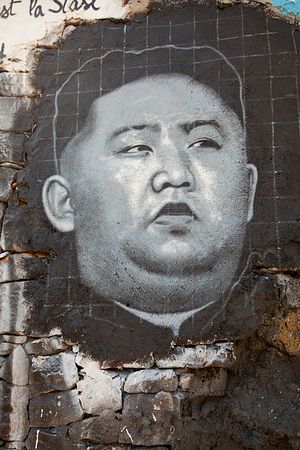Yet again Donald Trump has proved that he was not the most militaristic Republican running for President. Virtually alone he criticized the debacle in Iraq. Now, he declared, “I would speak to” North Korea’s Kim Jong-un, “I would have no problem.”
Most of Trump’s erstwhile Republican opponents were more likely to propose bombing than talking with Pyongyang. Democrat Hillary Clinton’s campaign was quick to attack Trump on the point.
The presumptive GOP presidential nominee also reemphasized his plan to pressure Beijing to take a tougher stand toward Pyongyang. That’s a dead end without addressing the reasons why Beijing supports its small, troublesome neighbor. However, engaging the so-called Democratic People’s Republic of Korea might help.
Whether Trump meant a summit, phone conversation, or diplomatic discussion is unclear. A face-to-face meeting probably would be unwise absent concrete accomplishments. Such a meeting would be better offered as inducement for the North taking serious steps to deescalate tensions on the Peninsula. In contrast, Washington should propose diplomatic talks, whether or not ultimately capped by a presidential conversation.
After all, other approaches are a nonstarter or have failed. Military strikes likely would trigger serious retaliation and possibly resumption of full-scale war. Sanctions have inflicted pain but not changed Pyongyang’s policy—and aren’t likely to do so without greater Chinese support. Finally, talks based on denuclearization, and especially tied to North Korean disarmament, have grown steadily less likely.
The DPRK is a nuclear state. Possession of a nuclear capability offers substantial benefits: defending against America and the latter’s propensity to impose regime change, gaining the prestige and attention that comes with nukes, enjoying the possibility of extorting benefits from its neighbors, and rewarding the military in domestic politics. In contrast, joining the international system and spurring economic growth risks stirring political instability, a fearsome prospect for those in power.
This doesn’t mean there is nothing that could be achieved diplomatically. First, even paranoids have enemies. North Korea feels under siege, distrusting China as well as the U.S. and the latter’s allies. Diminishing its sense of threat would at least create a possibility that Pyongyang would respond favorably to American initiatives.
Second, while the DPRK almost certainly would not voluntarily dismantle its existing nuclear arsenal, it might be willing to accept restrictions on future developments and proliferation. No one outside of Pyongyang wants to accept the North as a nuclear power, but better for Washington to limit the danger than reject the reality of North Korea’s bomb.
Third, enlisting China’s aid, meaning a willingness to cut energy and food assistance, thereby potentially threatening the survival of the North Korean state, requires convincing Beijing that Washington is not the principle cause of Pyongyang’s belligerency. That is unlikely without a significant American initiative to engage the DPRK.
Fourth, America could use a window, however small, into the Hermit Kingdom. Negotiations would offer a peek. Low level diplomatic relations would create an opportunity for more regular dialog. An offer of a summit outside of the North—in Beijing, perhaps—could subtly ratchet up pressure on Pyongyang.
Fifth, the DPRK desires direct talks with America. One reason may be enhanced prestige. But equally important may be the desire to balance against China, an overbearing neighbor for which the North has no great love. Washington should encourage more distance between the two nominal allies.
Of course, any talks should be conducted with realistic expectations. Pyongyang is hardly a model negotiating partner. North Korea has become ever more insistent on winning acceptance of its nuclear status, but that doesn’t preclude a more limited agreement at least moderating Pyongyang’s threats.
No surprise, Trump’s proposal to talk is controversial. The Bush administration’s Michael Green called a Kim-Trump meeting “a very bad idea.” Green complained that Kim won’t negotiate away his nukes, but that actually is a reason to establish bilateral contact.
Green also worried that addressing the North would reduce the confidence of South Korea and Japan in America’s nuclear umbrella. However, the prospect of U.S. allies going nuclear might encourage Pyongyang to deal and China to take a harder line toward the North. Further, Green complained that a “summit would cause despair for millions of suffering North Koreans,” but ever-tightening sanctions impose far greater hardship on average folks than on Kim and his cronies.
Despite a policy agenda highlighted by foolish and unrealistic proposals (starting trade wars and building walls, for instance), on Korea Donald Trump is more creative than the pros. Offering to talk with North Korea’s Kim Jong-un could help break today’s stalemate.
Doug Bandow is a Senior Fellow at the Cato Institute and a former Special Assistant to President Ronald Reagan. He is the author of Foreign Follies: America’s New Global Empire.

































